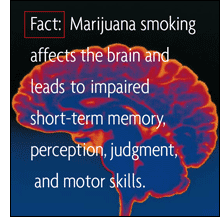 |


 Q: How does marijuana affect the brain? Q: How does marijuana affect the brain?
A: THC affects the nerve cells in the part of the brain where memories are formed. This makes it hard for the user to recall recent events (such as what happened a few minutes ago). It is hard to learn while high—a working short-term memory is required for learning and performing tasks that call for more than one or two steps.
Among a group of long-time heavy marijuana users in Costa Rica, researchers found that the people had great trouble when asked to recall a short list of words (a standard test of memory). People in that study group also found it very hard to focus their attention on the tests given to them.
As people age, they normally lose nerve cells in a region of the brain that is important for remembering events. Chronic exposure to THC may hasten the age-related loss of these nerve cells. In one study, researchers found that rats exposed to THC every day for 8 months (about 1/3 of their lifespan) showed a loss of brain cells comparable to rats that were twice their age. It is not known whether a similar effect occurs in humans. Researchers are still learning about the many ways that marijuana could affect the brain.
 Q: Can the drug cause mental illness? Q: Can the drug cause mental illness?
A: Scientists do not yet know whether the use of marijuana causes mental illness. Among the difficulties in this kind of research are determining whether drug use precedes or follows mental health problems; whether one causes the other; and/or whether both are due to other factors such as genetics or environmental conditions. High doses of marijuana can induce psychosis (disturbed perceptions and thoughts), and marijuana use can worsen psychotic symptoms in people who have schizophrenia. There is also evidence of increased rates of depression, anxiety, and suicidal thinking in chronic marijuana users. However, it is not yet clear whether marijuana is being used in an attempt to self-medicate an already present, but otherwise untreated, mental health problem or whether marijuana use leads to mental disorders (or both).
|
| <<
Previous Page |
Index |
Next Page >> |
|
 |

Marijuana: Facts for Teens (Revised)
La marihuana - Información para los adolescentes (Versión
Revisada)
Marijuana: Facts Parents Need to Know (Revised)
La marihuana: Lo que los padres deben saber (Versión
Revisada)
These publications may be reprinted without permission.
|
|